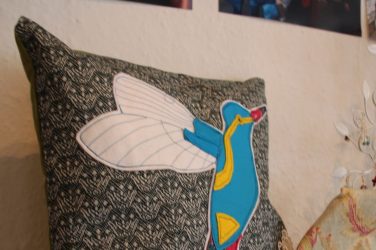Is there any place in the world where nationality does not matter? Yes, there is. Actually, there are many. In harbours and on ships, the world is a family, explains Axel Werth. He is a captain who travels the world on container ships and tells about what it is like to work in seafaring. In times of increasing nationalism the world might take a trip on a boat.
Only water and sky for up to one week – that is what Axel Werth loves about shipping. He grew up on as German island in the Baltic Sea and always wanted to work on a ship. As a captain for the transportation company Hapag Llyod he spends three months on a container ship which travels to several harbours in Europe, then to Asia and back to Hamburg. “A ship is like a bus, it stops at different places, but it is never empty”, he explains. His ships can carry about 13.000 TEU, a unit for the number of containers. And what is inside of all these containers? “No idea. For me it is just containers. I only need to know about reefer containers and those with hazardous substances.” He usually has regular working hours from nine to five. However, he is permanently on on-call duty. A captain is the boss on a ship, he has the overview about everything that goes on, from down in the engine room to up on the bridge. The time in a harbour is the busiest time for captain. It usually takes between 24 and 48 hours to unload and reload the containers. Not enough time to go on land as many harbours are far outside the cities to provide enough space for the massive ships.
As the captain Axel Werth also exactly knows what is going on in the crew. Usually, there are 23 people on his boats. Officers from different countries in Europe, mainly Germany, Poland, Croatia or the Netherlands and 16 seamen from the Philippines. “I need to make on team out of everybody as soon as possible because you have to rely on everybody. Every single person is needed”, says Axel Werth, “and it usually works.” Music instruments, a basketball court, a swimming pool, a gym – there are many things the crew can do together.

Far from home, close to each other
However, of course, everybody takes his own computer to watch films or play games. And there is one computer on the ship that has Wi-Fi via satellite and which is used frequently to stay in touch on Facebook. “You can call someone from time to time, send e-mails and be in touch via Facebook – you are not out of the world anymore”, describes Axel Werth. He himself does not call very often, just sends emails now and then. “If something happens, I know that my family would call me.” Of course, he tries to be up to date what is going on with his friends – but in German in general? “You get a big distance to what is going on in your home country. I only hear about the most important news, not about every single detail.”
And also his German nationality does not really matter, he says: “On a ship it really does not matter where somebody comes from. We speak English and we are one team. It is the same in harbours.” According to him, it makes no difference in which country a harbour is located and which nationality the harbour workers have. “It is one worldwide community.”
The shipping world is not a paradise. Working conditions and salary strongly depend on under which flag the ship is operating. So, nations still are an issue. But how does it come that the people feel like one community? To Axel Werth, this is very clear: “It is in the nature of shipping as there people have always dealt with people from different countries. It has always been a truly international industry.” After three months travelling around the world Axel Werth spends three months at home in his house in Berlin. “But after these weeks, I’m glad when I’m going back on the ship.”
Cover Photo: Hapag-Lloyd; Licence: CC BY-NC-ND 2.0






